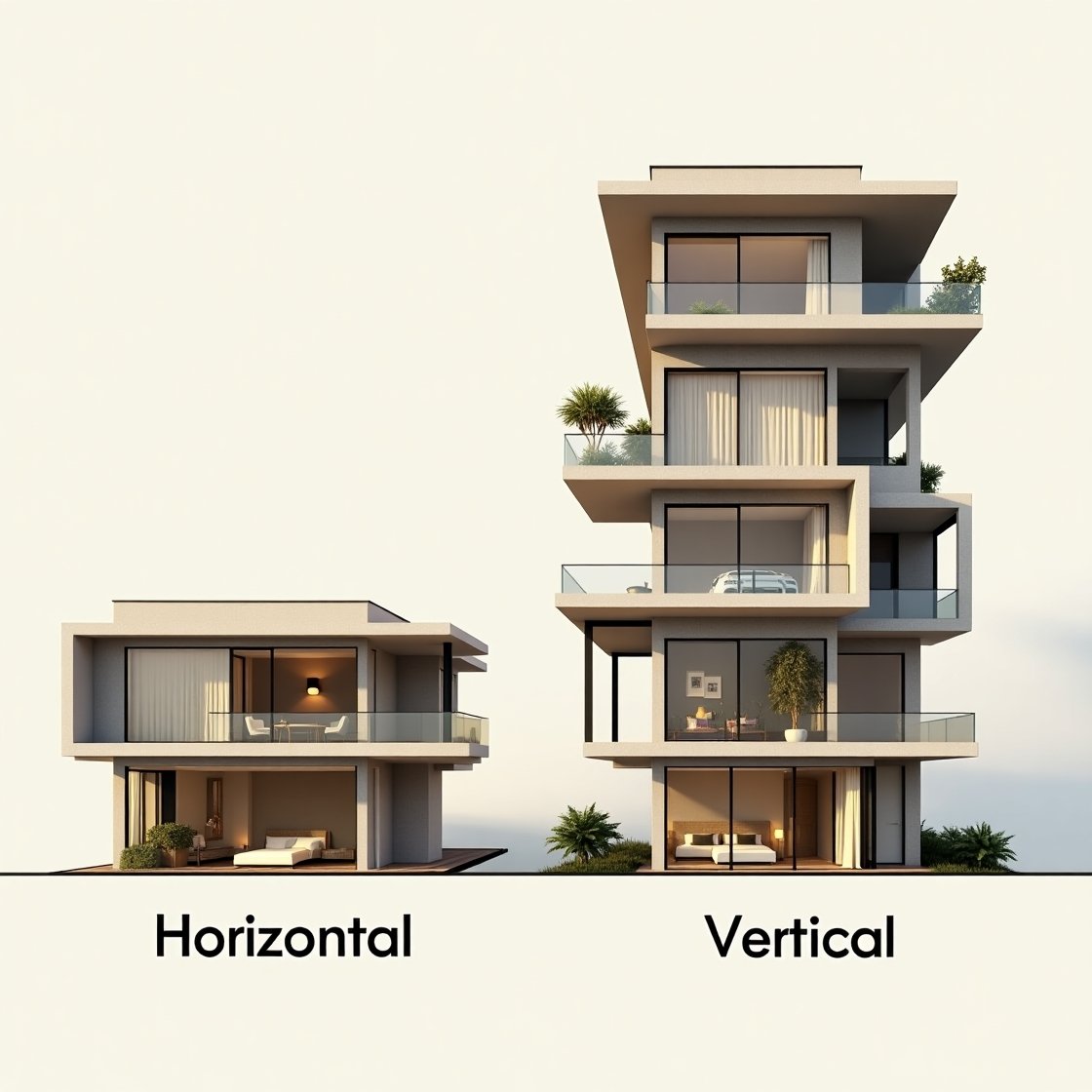When choosing a new home, one of the biggest decisions is whether to live in a horizontal gated community (detached houses in a planned environment) or a vertical condominium (apartments in a multi-story building). Both offer unique benefits and challenges, and the right choice depends on your lifestyle, budget, and long-term goals.
This article explores the key differences between horizontal and vertical condos, helping you determine which model suits you best.
1. Understanding the Basics
Horizontal Condos:
- Detached houses within a gated, managed community
- Private yards or gardens
- Shared amenities and security
- HOA fees for maintenance and infrastructure
Vertical Condos:
- Apartments stacked in multi-story buildings
- Shared hallways, elevators, and facilities
- Typically located in urban centers
- HOA or condo association manages common areas
Both are forms of shared ownership and community living, but their structure and experience are fundamentally different.
2. Space and Privacy
Horizontal condos generally offer:
- More square footage per unit
- Private outdoor areas (yards, patios)
- Greater separation between neighbors
Vertical condos provide:
- Compact living ideal for singles or couples
- Limited private outdoor space (balconies)
- Closer proximity to neighbors due to shared walls and floors
Consider: Do you value a yard and more physical distance, or are you comfortable with closer quarters for the sake of convenience?
3. Location and Accessibility
Vertical condos are often located in:
- City centers or high-density urban areas
- Close to public transportation, offices, and cultural hubs
Horizontal condos are typically:
- In suburban or peri-urban zones with more land
- Require driving for commuting and errands
Tip: If daily proximity to work and amenities matters, vertical may be ideal. For quieter, spacious living, horizontal wins.
4. Amenities and Lifestyle
Both types offer shared facilities, but the style differs.
- Horizontal condos: Outdoor-focused amenities like pools, walking trails, sports courts, and green spaces.
- Vertical condos: Indoor gyms, rooftop decks, co-working spaces, and sometimes pools or spas.
Lifestyle Check: Do you want open-air, ground-level recreation or high-rise convenience?
5. Security and Safety
Horizontal:
- Controlled access at the gate
- Security patrols and cameras
- Safe for children to play outdoors
Vertical:
- Lobby security or concierge
- Keycard or biometric access to elevators and units
- CCTV throughout common areas
Both offer strong security, but horizontal condos provide a neighborhood feel, while verticals rely on building-level control.
6. Maintenance Responsibilities
Horizontal condos often require:
- Personal yard upkeep
- Responsibility for exterior of your home
- HOA covers common areas
Vertical condos typically include:
- Exterior building maintenance
- Minimal personal responsibility beyond the unit interior
- Condo fees covering major structural upkeep
Cost Note: HOA fees for vertical condos may be higher due to elevators, complex systems, and insurance.
7. Community and Social Interaction
Horizontal condos foster:
- Neighborhood-style relationships with more space for outdoor gatherings
- Family-oriented activities
Vertical condos encourage:
- Close-knit interactions in shared hallways and amenities
- More transient populations in urban rental-heavy buildings
Social Preference: Do you want a suburban community vibe or urban social energy?
8. Cost and Value
Purchase Price:
- Horizontal condos: Often higher due to land ownership and house size, but vary by region.
- Vertical condos: More affordable entry point in many markets.
Long-Term Value:
- Horizontal condos tend to appreciate steadily in suburban markets.
- Vertical condos hold value in urban cores but fluctuate with city trends.
9. Family vs. Individual Living
Horizontal condos are often ideal for:
- Families with children
- Pet owners
- People wanting outdoor hobbies or gardens
Vertical condos suit:
- Singles or couples without children
- Busy professionals wanting low-maintenance living
- Those prioritizing urban proximity over space
10. Environmental Impact
- Horizontal: Larger land use, potential for eco-friendly yards and renewable energy installations.
- Vertical: Smaller land footprint per unit, higher energy efficiency in shared systems.
Both can be sustainable depending on design and management.
11. Noise and Comfort
- Horizontal condos offer less noise transfer between units.
- Vertical condos may face issues with footsteps above or shared walls.
Tip: For sensitive sleepers, horizontal living is often more peaceful.
12. Rules and Restrictions
Both have HOA or condo association rules, but:
- Horizontal condos focus on exterior aesthetics and landscaping.
- Vertical condos regulate balconies, hallway behavior, and interior noise.
Review rules carefully to ensure they fit your lifestyle.
13. Investment Perspective
- Horizontal condos appeal to long-term buyers and families, creating stable resale demand.
- Vertical condos are attractive for rental income, especially in high-demand cities.
Your investment goal — personal residence vs. rental — can guide your choice.
14. Resale and Market Trends
Market trends can influence value differently:
- Horizontal condos benefit from suburban expansion and demand for space.
- Vertical condos fluctuate with urban job markets and city density trends.
Pro Insight: Diversification — some investors hold both property types to balance market cycles.
Final Thoughts: Which Is Right for You?
Choosing between horizontal and vertical condos comes down to lifestyle priorities:
- Need for space, privacy, and a yard? → Horizontal.
- Value urban convenience and low maintenance? → Vertical.
- Raising a family or want a long-term residence? → Horizontal.
- Single professional or frequent traveler? → Vertical.
Neither is objectively better; the right choice aligns with your daily routines, future goals, and personal preferences.
